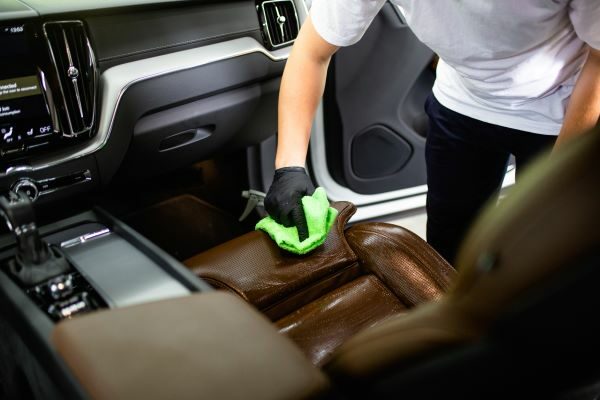
If you’ve noticed gas, sulfur, sweet, or burning smells coming from your car that you can’t get rid of, it may be time to bring your car to a mechanic for repair. These smells could be a sign of more serious problems with your car’s engine, such as overheating. Here are some types of smells to look out for and the car problems that are associated with them.
There is a burning smell in your car
The smell of burning rubber or burning plastic in your car could be caused by several different problems, and burning smells in cars occur most frequently as the result of two surfaces rubbing together. [1]
- Clutch: If the smell is similar to that of burning paper and is worse when shifting gears, you may need your clutch replaced.
- Electrical short: When there is a short circuit, the plastic around the wires can burn, producing the smell of burning plastic in your car. It’s best to consult a mechanic quickly in this instance so they can locate the electrical problem and fix it.
- Heater: A burning odor when you turn on your heater is usually a sign of dust or debris lodged in the vent. It is also possible that the heater itself is causing a burning odor from leaking antifreeze or even from the heater core melting.
- Brakes: A seized caliper piston in your brakes can also cause a burning smell during driving. This may require your attention or service. However, if you notice only a temporary burning smell after riding your brakes while going downhill, it is usually not cause for worry.
- Burning oil: An oil leak can drip into the exhaust while you are driving, causing a burning smell when you get out of the car. You’ll find this smell is worst when driving uphill and can cause your exhaust to get very hot. Burning oil in your car may also even result in fumes.
Get peace of mind with Nationwide auto insurance
Protect yourself and your vehicle with an auto insurance policy from Nationwide. Learn about what we cover and see how you can save on a policy today.

Your car smells like gas
The smell of gas in your car is abnormal and can indicate several issues that require prompt attention. [2]
- A leak in your fuel system: The best way to check if you are experiencing a gas leak is to look for a puddle under your vehicle. Gas leaks can happen anywhere in your car’s gas system and can be very dangerous because gas puddles can catch on fire. If you suspect your car has a gas leak, take it to a mechanic as soon as possible.
- Problems with your fuel pressure regulator: A bad fuel pressure regulator can interfere with your fuel mixture, making it either too thin or too rich, causing your car to burn gas excessively. Along with the smell of gas while driving, a bad fuel pressure regulator will also cause decreased fuel efficiency and engine power.
- Exposure to gas fumes: This is the most common reason you could smell gas in your car. If you recently parked at a busy gas station, the fumes can make their way into your car, resulting in an odor. This smell should eventually fade, but if it doesn’t you are probably dealing with a more serious issue.
There is a vinegar smell in your car
A variety of things can cause a vinegar smell in your car, ranging from mold to bad transmission fluid. [3]
- Mold and mildew: When you smell vinegar in your vehicle, mold or mildew are the usual suspects. Mold and mildew can grow in the vents of your air conditioning system as a result of excess moisture.
- Faulty drainage system: Cars are equipped with drain tubes to remove excess condensation. When your drainage system isn’t functioning properly, mold can grow after water drippings overflow the condensate drain line and the air conditioner spreads the moisture throughout the air.
- Dirty cabin filter: If your filter is clogged or dirty, it will be unable to do its job to help eliminate lingering smells and keep air clean, leading to odors.
- Rotten food: Take a peek under your seats or in crevices to be sure there’s no rotten food that got stuck in your vehicle. Rotten food can also develop mold and lead to some particularly unpleasant odors.
- Battery acid leak: While most people would describe the scent of battery acid leaking as a rotten egg smell, this odor can also be perceived as smelling like vinegar.
Your car smells like rotten eggs or sulfur
If your car smells like rotten eggs or sulfur, there’s probably a serious problem. Sulfur naturally occurs in fuel and is converted into an odorless compound when combusted and after going through your car’s emission control system. If you’re smelling sulfur, it’s most likely caused by one of these 3 common problems: [4]
- Transmission fluid: A rotten egg smell occurs when transmission fluid leaks beyond the transmission system. That’s why it’s important to change your car’s transmission fluid as often as your car’s manufacturer recommends.
- Fuel pressure sensor malfunction: A malfunctioning fuel filter or fuel pressure sensor can cause your catalytic converter to flood with oil, causing odor and preventing your catalytic converter from working properly.
- Faulty catalytic converter: The catalytic converter neutralizes emissions into harmless gases. When a catalytic converter is clogged or malfunctions, it can lead to the emission of harmful sulfur gas. A catalytic converter with a buildup of byproducts may also overheat, further intensifying the smell of rotten eggs.
There is a sweet smell in your car
A sweet smell in your car such as maple syrup—or celery may indicate that your car is leaking coolant or antifreeze. This is a serious problem because if your car leaks too much coolant, it can cause your vehicle to overheat and can even result in total engine failure. An engine that fails from overheating cannot be repaired and needs to be replaced completely, so if you smell a sweet odor that you think may be leaked coolant, speak to a trusted professional as soon as possible. [5]
You are smelling exhaust fumes in your car
If you are smelling exhaust fumes in your car and have determined that the odor is not coming from another vehicle, you should stop driving and call a tow truck. Your car could have an exhaust leak, which is extremely dangerous and can result in carbon monoxide poisoning. [6]
An unusual smell coming from your car is usually a clear indication that your vehicle isn’t working as it should, and some odors can indicate a malfunction that is dangerous. Keep yourself and other drivers safe by staying on top of your car’s maintenance schedule and calling your trusted mechanic at the first sign that something may be wrong.
Sources:
[1] “Burning Smell from a Car: Understand What’s Happening,” www.carsdirect.com/car-maintenance/burning-smell-from-a-car-understand-whats-happening
[2] “3 Reasons You Might Smell Gasoline When You’re Driving,” www.classictoyotatyler.com/blogs/2332/3-reasons-you-might-smell-gasoline-when-youre-driving/
[3] “Why Does My Car Smell Like Vinegar And What Can I Do About It?” www.motorborne.com/why-does-my-car-smell-like-vinegar/
[4] “3 Reasons Why Your Car Smells Like Rotten Eggs,” mcspaddenautomotive.com/blog/3-reasons-why-your-car-smells-like-rotten-eggs
[5] “Why is there a sweet smell coming from my car?” www.mbscottsdale.com/blog/why-is-there-a-sweet-smell-coming-from-my-car/
[6] “Four Things to Know if You Smell Exhaust in Your Vehicle in Salem,” www.capitolsubaru.com/service/information/things-to-know-if-you-smell-car-exhaust-in-your-car-salem-or.htm
Disclaimer:
The information included here is designed for informational purposes only. It is not legal, tax, financial or any other sort of advice, nor is it a substitute for such advice. The information may not apply to your specific situation. We have tried to make sure the information is accurate, but it could be outdated or even inaccurate in parts. It is the reader’s responsibility to comply with any applicable local, state or federal regulations. Nationwide Mutual Insurance Company, its affiliates and their employees make no warranties about the information nor guarantee of results, and they assume no liability in connection with the information provided. Nationwide and the Nationwide N and Eagle are service marks of Nationwide Mutual Insurance Company. © 2022 Nationwide



